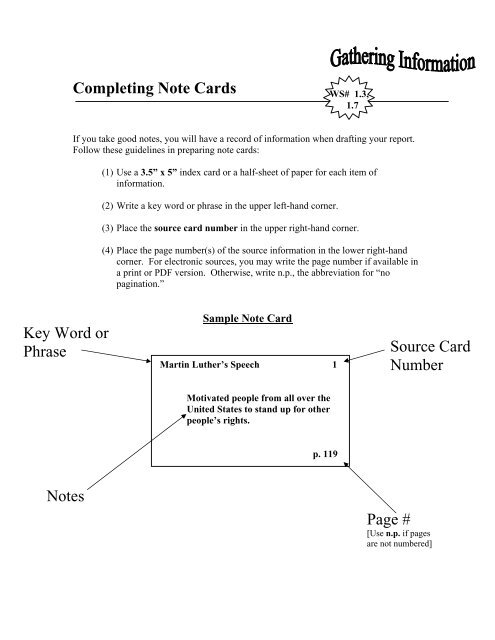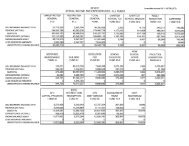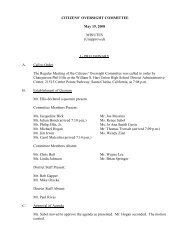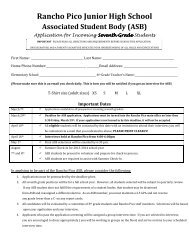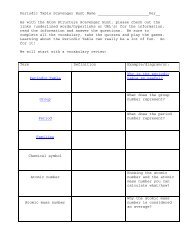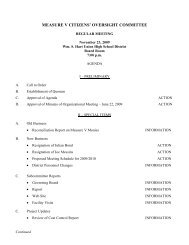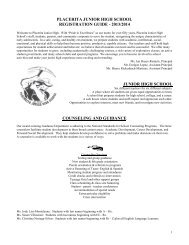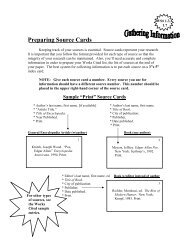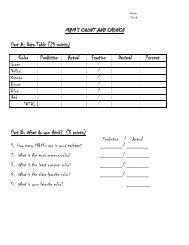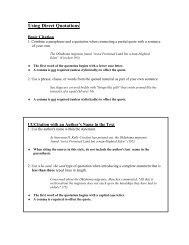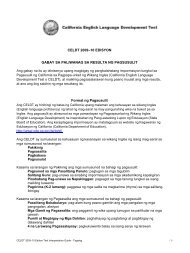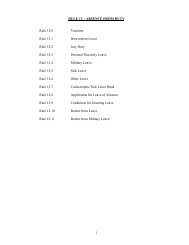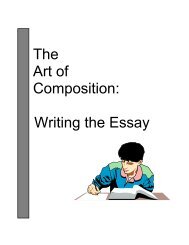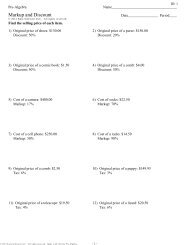Completing Note Cards Notes Source Card Number Key Word or ...
Completing Note Cards Notes Source Card Number Key Word or ...
Completing Note Cards Notes Source Card Number Key Word or ...
You also want an ePaper? Increase the reach of your titles
YUMPU automatically turns print PDFs into web optimized ePapers that Google loves.
<strong>Completing</strong> <strong>Note</strong> <strong><strong>Card</strong>s</strong><br />
WS# 1.3,<br />
1.7<br />
If you take good notes, you will have a rec<strong>or</strong>d of inf<strong>or</strong>mation when drafting your rep<strong>or</strong>t.<br />
Follow these guidelines in preparing note cards:<br />
(1) Use a 3.5” x 5” index card <strong>or</strong> a half-sheet of paper f<strong>or</strong> each item of<br />
inf<strong>or</strong>mation.<br />
(2) Write a key w<strong>or</strong>d <strong>or</strong> phrase in the upper left-hand c<strong>or</strong>ner.<br />
(3) Place the source card number in the upper right-hand c<strong>or</strong>ner.<br />
(4) Place the page number(s) of the source inf<strong>or</strong>mation in the lower right-hand<br />
c<strong>or</strong>ner. F<strong>or</strong> electronic sources, you may write the page number if available in<br />
a print <strong>or</strong> PDF version. Otherwise, write n.p., the abbreviation f<strong>or</strong> “no<br />
pagination.”<br />
<strong>Key</strong> <strong>W<strong>or</strong>d</strong> <strong>or</strong><br />
Phrase<br />
Sample <strong>Note</strong> <strong>Card</strong><br />
Martin Luther’s Speech 1<br />
<strong>Source</strong> <strong>Card</strong><br />
<strong>Number</strong><br />
Motivated people from all over the<br />
United States to stand up f<strong>or</strong> other<br />
people’s rights.<br />
p. 119<br />
<strong>Note</strong>s<br />
Page #<br />
[Use n.p. if pages<br />
are not numbered]
Types of <strong>Note</strong>s<br />
As you take notes, you will summarize, paraphrase, <strong>or</strong> directly quote directly from the<br />
source material. Look at how the inf<strong>or</strong>mation is taken from the paragraph below:<br />
I have a dream, too – that the literary merits of Martin Luther King’s “I have a<br />
Dream” speech will be th<strong>or</strong>oughly appreciated in every speech class in the nation. It is,<br />
quite frankly, one of the finest examples of rhet<strong>or</strong>ic in this century. The speech positively<br />
rings with genuine sincerity, conviction, and purpose. King’s use of repetition to stir the<br />
audience and his use of biblical allusions are masterful. The speech was given on August<br />
28, 1963, bef<strong>or</strong>e a quarter of a million people in Washington, D.C. It moved people then,<br />
and it continues to move us today (Elements of Literature 206).<br />
King’s Speech 1<br />
“I have a dream, too – that the literary<br />
merits of Martin Luther King’s “I have a<br />
Dream” speech will be th<strong>or</strong>oughly<br />
appreciated in every speech class in the<br />
nation.”<br />
p. 206<br />
<br />
<br />
Directly quote only when it is<br />
imp<strong>or</strong>tant to know the auth<strong>or</strong>’s<br />
exact w<strong>or</strong>ds.<br />
Copy the source material w<strong>or</strong>d<br />
f<strong>or</strong> w<strong>or</strong>d, including punctuation<br />
marks.<br />
<br />
<br />
<br />
Paraphrase when you need to<br />
remember the detailed inf<strong>or</strong>mation.<br />
Restate the material using your own<br />
w<strong>or</strong>ds and sentence structure.<br />
Begin by identifying the writer<br />
whose w<strong>or</strong>ds you’re paraphrasing.<br />
Merits of King’s Speech 1<br />
James Wisdom claims that the “I Have a<br />
Dream Speech” by Martin Luther King Jr.,<br />
is one of the century’s best examples of<br />
Rhet<strong>or</strong>ic. King uses repetition and biblical<br />
allusions well and is sincere and purposeful.<br />
King made the speech August 28, 1963, in<br />
Washington D.C., in front of a quarter of<br />
million people.<br />
p. 206<br />
About King’s Speech 1<br />
The “I Have a Dream” speech by Martin<br />
Luther King, Jr., delivered August 28, 1963,<br />
in Washington D.C., bef<strong>or</strong>e a quarter of a<br />
million people, is one of this century’s best<br />
examples of rhet<strong>or</strong>ic.<br />
p. 206<br />
<br />
<br />
Summarize when you need to<br />
remember only the main idea.<br />
Read the material first and write<br />
the note in your own w<strong>or</strong>ds.


